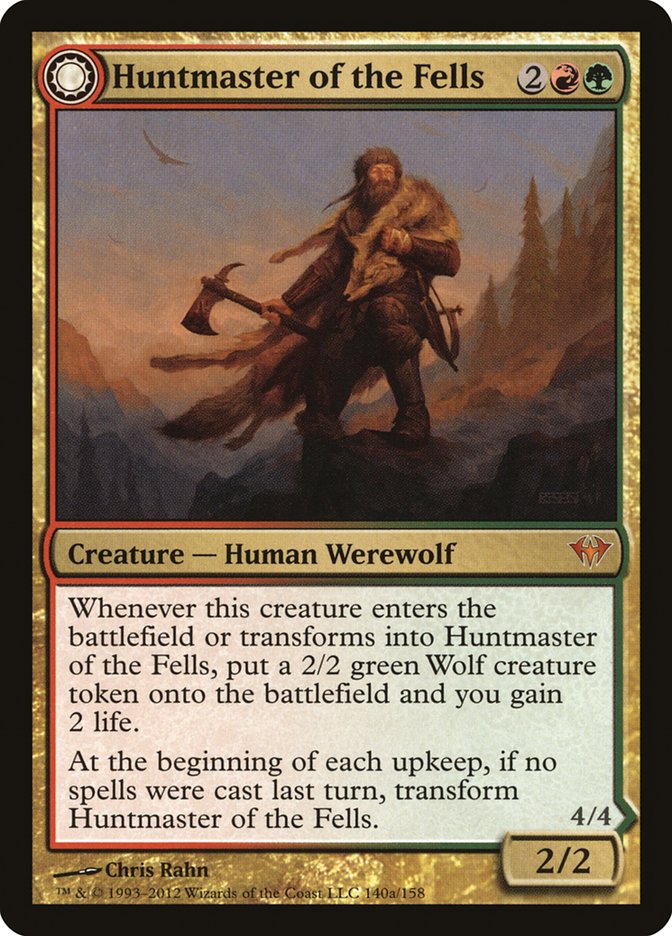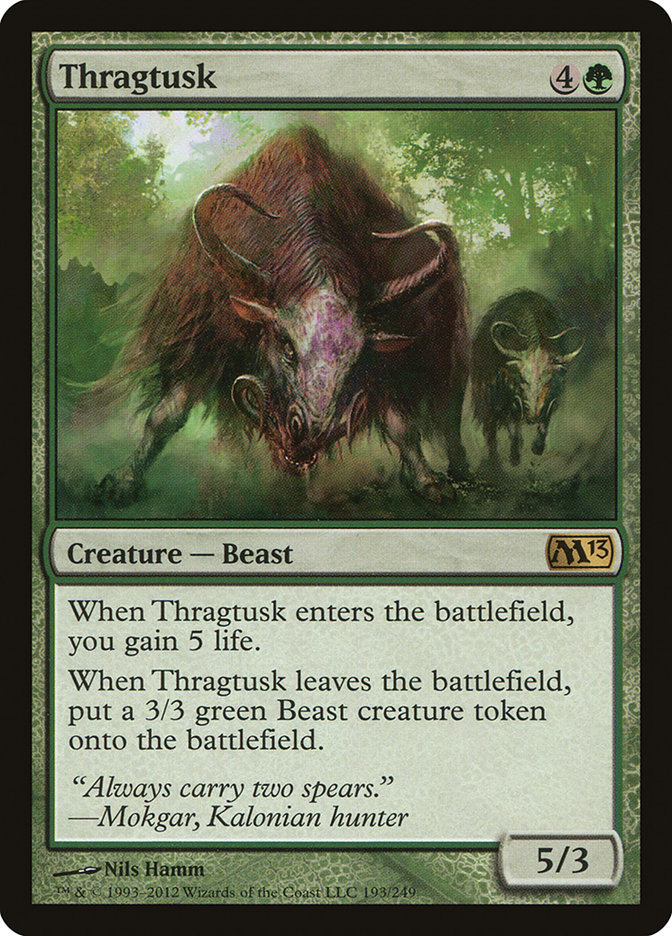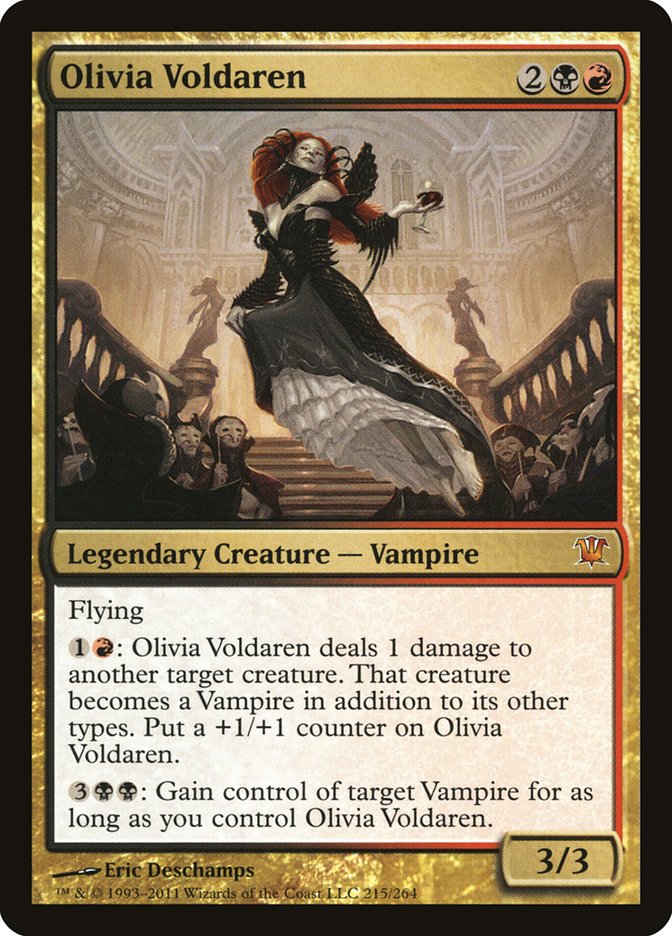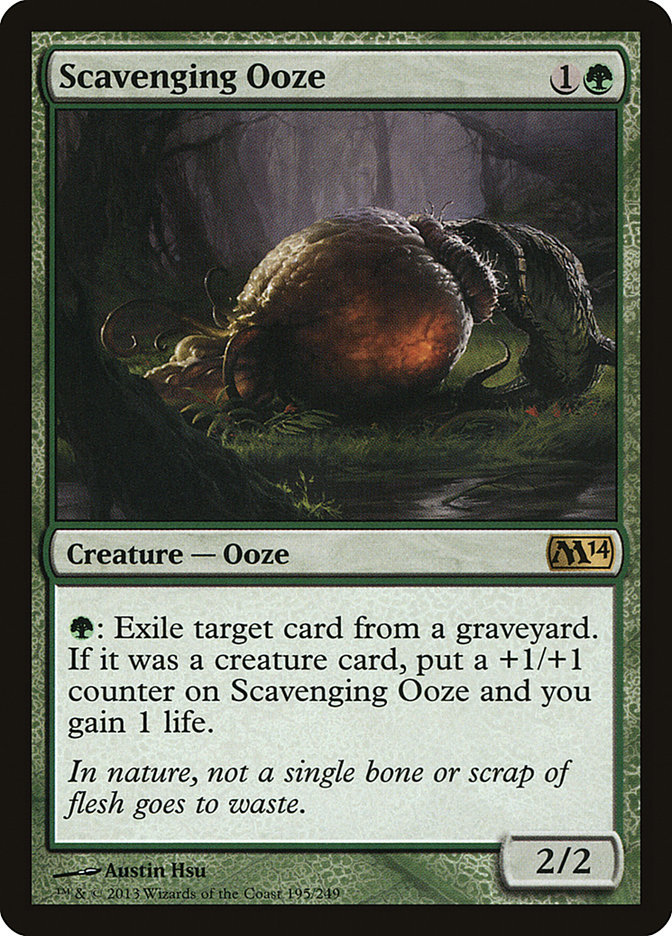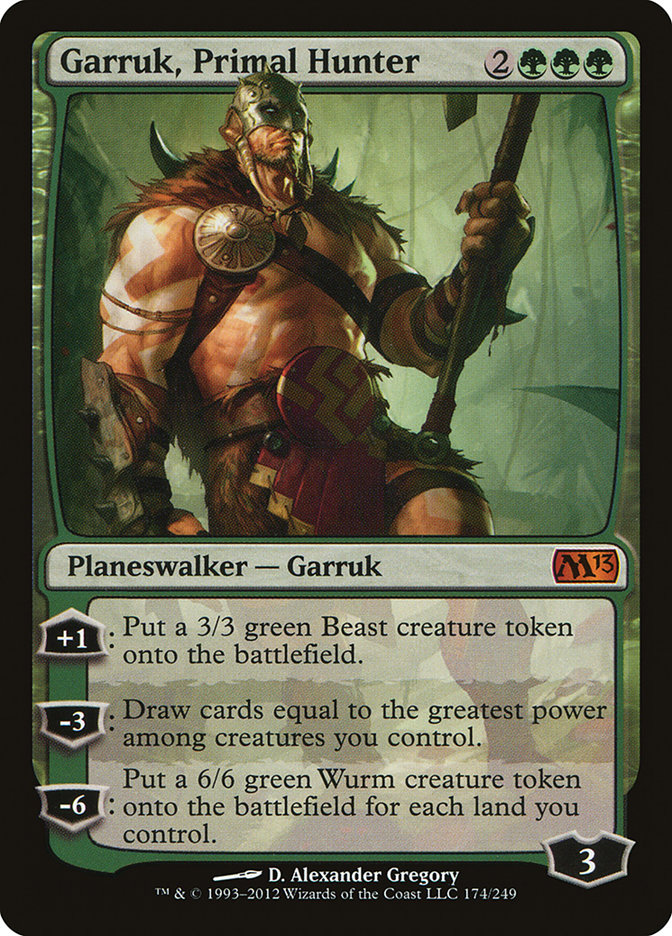Just. Play. Jund.
Just do it.
Stop being an idiot and go pick up the cards you need to play it.
I’m one of the biggest advocates for playing Sphinx’s Revelation. The card is huge. Almost too good. But if I’ve learned anything over the last twelve or so years of playing Magic, it is this:
Play the best deck.
This is especially true when the best deck doesn’t have a natural foil in the format.
Sure, you can argue that Burning Earth is the end for Jund, but have you actually played the games out? Have you actually seen how the dynamic changes for a game once you play with Burning Earth? Have you noticed how easy it is for a deck like Jund to ignore Burning Earth when they’re clocking you with a Thragtusk or Huntmaster of the Fells?
I have, and it isn’t very pretty.
The problem with Burning Earth is that it isn’t free. Don’t let anyone tell you how good Burning Earth is against Jund until they’ve spent an entire turn facing down a Huntmaster of the Fells and used said turn to cast Burning Earth instead of progressing the board.
And that is the problem, really.
If you spend an entire turn casting Burning Earth against a deck full of powerful, proactive threats, you’re going to fall too far behind, and the few points of life dealt by Burning Earth aren’t going to matter. Your Hellriders, Thundermaw Hellkites, and everything else will just die to Doom Blade or Putrefy, and you’ll get run over.
Burning Earth isn’t bad, but the truth of the matter is that Burning Earth is much better against decks that rely on reactive strategies but everyone is being blinded by its text. Just because a deck is full of nonbasic lands doesn’t mean Burning Earth is good against it. The difference between a proactive and reactive deck is everything. Every Sphinx’s Revelation nets them negative life. Every removal spell or counterspell deals them damage, and in the meantime they aren’t attacking you with a relevant threat. They aren’t able to capitalize on the entire turn lost to cast Burning Earth.
And because of this, Jund still thrives.
The "My Deck Beats Faeries" Argument
People think that Burning Earth is enough, so they don’t prepare for Jund any more beyond it. Sitting behind that protective barrier, they feel safe, even confident that they have a good matchup against one of the most dominant decks in the recent history of Standard. This sentiment feels similar to the one that I laughed at the most back during the Faeries era.
"Cloudthresher is my answer, and they just can’t beat it!"
"Faeries is a good matchup because I have Volcanic Fallout."
"Great Sable Stag is too tough for them to race!"
Is that really the argument? Your Faerie opponent can’t race Gnarled Mass? Have you even read Cryptic Command? Do you even lift?
These are all questions I asked people when they spouted off about how good their deck was against Faeries, and then I would proceed to dismantle them with Thoughtseize, Mistbind Clique, and Cryptic Command.
In theory, these cards were good against Faeries. Sometimes they were enough to turn the tide of a game. However, they did not always win you the game, and Faeries could often overcome these hurdles through various means. The deck was so full of powerful spells that were both proactive and reactive that it was hard to really dig your feet in and beat it.
The main point I’m trying to get across is that just because a card seems good in theory against a particularly prominent archetype doesn’t mean it is good in actuality. Yes, Great Sable Stag and Volcanic Fallout were designed with Faeries in mind because Faeries was too good, but that doesn’t mean the decks sporting the hate cards were good. Many mono-red aggressive decks played Volcanic Fallout despite the fact that it killed many of their own creatures. It also didn’t help that Great Sable Stag was printed when Faeries only had three months left in Standard, but that’s beside the point.
The reason why Faeries was a good deck is because it was hard to attack. It could adapt on multiple levels to accommodate early- and late-game threats. It could get aggressive in a heartbeat and turn your deck on its head with some of the mind-boggling interactions. The elements that made Faeries into a monster were not easily contained, and that was the ultimate lesson people learned in the end.
While Jund is an entirely different animal than Faeries, the same principle holds true. What you think "beats" Jund is just another card they have to deal with, but they can beat it given the correct set of circumstances. The burden is on you to present them with a series of obstacles that is too hard for them to jump through. If you can’t put pressure on them in the early turns of the game, why would they ever care about Burning Earth? If you aren’t killing them, won’t they eventually be able to resolve a spell?
The "You Still Have to Beat Other Decks" Argument
So you think your deck has a good Jund matchup. That’s awesome. Maybe you’re right for a change, and you do have a good Jund matchup. Maybe the collection of cards you’ve assembled are all just too tough for Jund to deal with, and you defeat them easily. Let’s say you even beat it 80% of the time.
In a ten-round tournament, if you play against Jund every single round, you are going to go 8-2, which still isn’t enough to make the Top 8.
What about your deck makes it so overwhelmingly good against Jund? Maybe you play a ton of Dissipates and Syncopates, and it is very unlikely they’ll resolve a single spell. That makes sense, as decks with counterspells tend to prey on midrange strategies that don’t start deploying threats until turn 3-4.
But what’s your kill condition? Do you play removal? How good is the removal against an aggressive deck? Can you actually win the game if they resolve a Rakdos’s Return or even a Thragtusk? What if they randomly decide that Cavern of Souls is a good idea this week and you get obliterated?
And the last question I want to ask is this:
How does your deck fare against the other ten decks in the format?
One thing people don’t realize when choosing a deck for a tournament is that you have to be prepared for a field of diverse strategies. Your deck can beat the top dog as often as you want it to, but skewing your deck or card choices based on one matchup is a great way for you to lose to everything else. Once you start packing enough hate, you’ll see your deck start to slip in other matchups. Finding the right balance is key, but sometimes it is just too hard. I think this is that moment in time where the best deck in Standard is too hard to hate out because it doesn’t actually have a linear strategy and functions strongly on too many levels.
When you have a "best deck" in a format, that deck generally has a proactive strategy that plays the best spells in the format, and there isn’t a whole lot that anyone else can do to stop you. Jund is a great example of this because it has powerful threats that flourish against a variety of archetypes. Let’s take a look.
Of these creatures, all of them do amazing stuff no matter what the opponent is playing except maybe Olivia Voldaren, but her upside is so outstanding against creature-based decks that it is hard not to argue that she is the best creature in the deck. Some decks are completely invalidated by the existence of Olivia Voldaren, which says a lot about one creature that sees play in one deck. Without a viable answer to Olivia, many decks will fold to her almost singlehandedly.
Scavenging Ooze is the newest addition to the deck but definitely gave the strategy some flexibility. It gives you a new angle of gameplay that varies from the dynamic start of Farseek into Huntmaster of the Fells. With so many removal spells in the deck and the natural inclination of creatures to hit the graveyard, Scavenging Ooze will almost always have something to munch on. Scavenging Ooze also gives you a solid maindeck answer to Unburial Rites strategies that functions well against aggressive decks.
Huntmaster of the Fells only gets better when you stop casting spells. If you’re able to flip it at an advantage, then it feels pretty tough to lose. Add to this the fact that you’re presenting multiple blockers, a few points of life gain, and the threat of consistently flipping back and forth for more pain. It is a nightmare for most decks containing creatures and still a particular annoyance for a reactive deck since they don’t really want to cast spells on their own turn.
Thragtusk poses a large body with the threat of a two for one against any deck willing to enter the red zone. If you add the additional five points of life against an aggressive deck, it feels like much more than a two for one. Even against control decks Thragtusk is a problem. Most spot removal spells don’t take care of it singlehandedly, and Supreme Verdict / Terminus are pretty below average answers. In the best-case scenario, you are able to counter it with Dissipate or Syncopate, but you have a finite number of those. What about the rest of the threats? What about Rakdos’s Return? Will you always have a counterspell at the ready?
What about Garruk, Primal Hunter?
Well, for one, Garruk, Primal Hunter is a green version of Sphinx’s Revelation. If you’ve ever thought it was hard to lose when you resolved a Sphinx’s Revelation, try casting Thragtusk into Garruk. The feeling is similar, yet it feels so much better for some reason. I think the main reason is that you’re a proactive deck and the cards you draw will end up having a significant impact on the game. In a Sphinx’s Revelation deck, many of the cards you draw end up being Think Twice, Azorius Charm, and a smattering of reactive spells.
Garruk, Primal Hunter also gives you a way to generate a stream of threats against any deck that wants to cast sweeper effects. Resolving a Garruk, Primal Hunter against any reactive strategy always feels so good because they have very few answers to it.
The thing is that three of these five threats gain life when they enter the battlefield, offsetting some of the life you could lose to Burning Earth while also putting an ample amount of pressure on the table. All of these threats are also overly oppressive to the decks that are trying to beat them with Burning Earth.
If you need any further reasoning of why Burning Earth isn’t that good against Jund, hear it from the mouth of The Babe:
"One thing that I realized while I was testing against Lifebane Jund was that Burning Earth was not particularly effective. With so many cheap spells in their deck, it was possible for Jund to be at parity or even ahead in the early turns of the game, which made Burning Earth a very weak play, especially when they could just make up the life loss with Huntmaster of the Fells and Thragtusk and absolutely bury you if you took a turn off to play it."
–Brian Kibler, in regards to his G/R Aggro deck in last week’s article
While this is taken a little out of context, as he is specifically talking about Lifebane Jund, I think most of the points hold true. Burning Earth is a fantastic sideboard card when your opponent isn’t doing much of anything, but you’re usually beating those draws from Jund anyway. Burning Earth is a card to beat reactive decks and not so great at beating proactive ones.
The Huey Jensen Argument
Let’s be real, because William Jensen isn’t. I mean, he’s a guy. I’ve met him. But he isn’t a real human being. The guy is just absurd at Magic in all forms. He recently swept the dust off and got back into the swing of things, and he has put up some outstanding results over the last few months, including a win at SCG Standard Open: Salt Lake City.
The argument I’m trying to make here is that Huey Jensen is a very smart guy. He could probably win a tournament with a turkey sandwich and half a bag of Doritos. [Editor’s Note: What flavor of Doritos?] This is convenient because it’s the same lunch his mom always packed him before each PTQ that he won when he was a teenager. This is also convenient because it is a made-up story, but it could very easily be true.
Huey knows his way around the format quite well now and has made Top 8 of SCG Standard Opens with three different decks in the last month. For the last one, he chose Jund. Can you guess which of these events he ended up winning?
It’s hard to argue with results, and it’s even harder to argue with smart people that put up those results. As a result, I have written this article on why you should just give up whatever else you’re doing and play the best deck in the field.
I mean, do you honestly think that Huey didn’t have to beat approximately infinity Kiblerites playing the G/R Aggro deck featuring the one-and-only Burning Earth? Do you really believe that your deck is a better choice for a diverse field when Jund just so happens to be the most popular deck and still continues to win tournaments? The hate is there, but it isn’t working. Jund continues to win in spite of the hate cards being thrown at it.
Creatures (14)
Planeswalkers (2)
Lands (25)
Spells (19)

I hate Jund. I hate everything it stands for. I hate it with every part of my being because it isn’t a deck. It is a collection of overpowered cards with a perfect mana base. It is a ramp deck without a singular goal. It is devoid of purpose and has no binding qualities. There is no central theme of the deck, no linchpin to exploit. There is no theme. And maybe that is what is so frustrating to me about the deck.
Its goal is simple: to cast its spells. And those spells are so good that games usually end in your favor.
The fact that I’m advocating playing Jund should be reason enough to play it because I would rather play literally anything else (well, except maybe Hexproof).
I don’t want to expunge the hopes of the brewers out there. For God’s sake, please prove me wrong. I would love nothing more than to see a Burn at the Stake deck take down the SCG Standard Open in Baltimore this weekend, but I would not be doing my job if I didn’t give you an informed, honest opinion of the format. Play Jund. Or don’t. Honestly, I’m not even sure I’ll be able to bring myself to do it, but I know I should.
And that, my friend, is the most frightening part of it all.
Todd Anderson
strong sad on Magic Online
@strong_sad on Twitter

